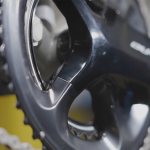By Eric Smith
It shouldn’t be surprising that when Scarpa North America CEO Kim Miller was summoned from his office for a recent appointment at the company’s Boulder, CO, headquarters, he trudged to the building’s entrance in ski boots.
What else would one expect from an industry stalwart who has spent his entire career testing the fit, feel and performance of shoes and boots for all manner of outdoor activity?
“I’ve known footwear for a long time,” Miller said as he smiled and peeled off those boots for regular shoes, then sat down with SGB for a wide-ranging interview about his career as well as what’s happening at Scarpa and across the industry.
Miller, a Denver native, started in the boot business when he was in high school. He worked as a cobbler’s apprentice for a popular mom-and-pop store where locals would bring their burly hiking boots for resoling.
Though Miller studied education and planned to teach, he wound up back in the outdoors industry because of his interest in the business as well his passion for skiing, hiking and climbing. His career stops have included a retail shop (where he sold Scarpa boots), Chouinard Equipment, Black Diamond and finally Scarpa, where he has been CEO of its North America operation since January 2006.
As someone who has worked in all facets of the industry for decades, Miller has seen many changes, from improved manufacturing processes and more efficient supply chains to the growing importance of sustainability and increased emphasis on brand storytelling. But two changes within the footwear business stand out as the most significant, Miller said.
“Our consumer has changed immensely and so has the way that we sell product,” he said. “Obviously, the internet changed a lot of things over that period of time. But in terms of the consumer, it’s a lot more diverse. There are a lot more things that people are interested in besides the outdoors. It’s not just a core group of people that we’re trying to speak to. We want everybody to go outside and there’s a lot of reasons for that. But in terms of the business and the commercial side, it’s become a lot more competitive.”
For all the changes in the manufacturing, distribution, sales and marketing of footwear, however, some things have remained the same both for Miller and the company where he’s worked for the past 12 years.
Miller still loves everything about the footwear business, as evidenced by his willingness to test product in the office or in the field, even as CEO. And Scarpa has remained true to its roots and its vision, which Miller called sacrosanct. Founded in 1938 as a family-owned bootmaker, the company’s home is still in the Dolomite region of Italy and it’s still owned by the same family.
Scarpa is celebrating is 80th anniversary, and as Miller sees it, the company is a rare gem in the industry, a family-owned and vertically integrated shoe maker that maintains the same vision of producing quality footwear even as it adapts to the new realities of today’s marketplace.
“We control our destiny, we make our own product, we use our own factories, we reinvest in our business,” Miller said. “We’re virtually self-financed and we’re frugal as hell. Our business was started and run by three brothers during postwar Italy. But they’ve grown this business like a farm. They take care of it like a vineyard and they have tended to this company in that same way since … forever.”
Here is the rest of what Miller shared with SGB about today’s business climate for Scarpa, as well as what has kept the company going strong for 80 years and where the industry is heading.
How’s business, and what categories are driving growth for Scarpa NA? Business is good. We see this big liftoff to fall and it’s always really a fun time, especially when it feels like it’s going to be a good winter and people are stoked. There’s a lot of excitement and energy around that. In general, business has been good across our main categories for a while now, but there’s a lot of disruption and a lot of things that are changing, so it’s a time to really be paying attention. There are changes in trade and duty—those implications are huge for us, for everyone—so it’s not a time to sit back and say, ‘Yeah, life is good. Just ride it out.’ We’re pretty strategic. We try to think ahead. We try to anticipate things in part because we’re a family-owned Italian business. We don’t move quickly, so it’s really important to look out onto the horizon. It’s like climbing for me. The weather’s been too good for too long. Something’s going to break down. So don’t get overconfident, don’t over extend, stick to the plan and don’t get enticed by other temptations that you know are out of our scope.
Congrats on the brand turning 80. We hear a lot about brands celebrating milestones, but what does such longevity say about Scarpa? Our customers are the ones that have made this happen for us. We always ask ourselves what are we doing that keeps us relevant in the minds of the consumer? The consumers ultimately vote, especially on the long-term, because a company is supplying what they need. In terms of how we’ve been able to sustain our business while doing that, we are family-owned and have stayed true to our vision, not being distracted by the temptations of expansion in places where we aren’t experts or selling the brand to some other group that will not be Scarpa anymore. It truly is a family company.
Besides the family-owned aspect, what sets a brand like Scarpa apart these days? Is it purely about product, or are there other business factors that are just as important? Absolutely. We make great product—thank God for that—but it’s not going to win the day by itself anymore. There are a lot of other areas where we need to be good—marketing, logistics, operations—all the things that are easy to overlook when you’re thinking about big-picture strategy. You still have to focus on blocking and tackling, being responsive, making sure that you have good customer service, making a fair price, making sure that you deliver on time, making your product accessible, having good communication with your dealer. But I’m going back to those basics more than I’m talking about the big picture because things move a lot quicker now. I hesitate to use these words because they’re overused, but it’s truly about being a “good partner,” which means pushing each other, listening, good communication, hitting your responsibilities and then being not being afraid to ask for the same in return. We also protect MAP whenever we can, don’t sell against our dealers, don’t discount on our website and are very careful about who we sell to, understanding very well the implications. We don’t sell our ski boots or rock shoes to Amazon. It goes back to that partnership, that give and take. We can’t expect our retailers to survive in that environment.
Scarpa touts its vertical integration an advantage; how is this a differentiator for the company? The benefit is for us is that we control every step. We also control all the knowledge, expertise and intellectual property that goes into those designs and we hold those things really close to the vest because they’re secret. There really are things that we think we can do better than anybody else. You could probably reverse engineer a lot of what we do, but it won’t have the same result. We haven’t found anybody else who can really do things the way we do it. A lot of our machines we designed because we want to be on that leading edge of technology. It is pretty important and it’s not only for the competitive advantage. It’s also the desire to control production and get what we need.
Sustainability continues to be an industry buzz word. How has the environmental focus shifted in recent years, are customers demanding it more of brands—and are brands delivering? I think there’s two parts of that: what we’re doing and what we’re telling people we’re doing. And I think we can do a lot better job about telling people what we’re doing because we’re doing a lot. The most important thing that we can do really starts with how we make our products and what we use to make them. That includes using leather that has been dyed in a different way so we reduced the use of harsh chemicals and carcinogens, and also making ski boots out of castor oil. [Another example is Scarpa repairs old ski boots at its Boulder facility, as Miller pointed out on a tour.] The idea of not throwing a ski boot away is huge. Even though we know we’re losing a sale when we do that, in the end we can win on the back end of that. If we keep innovating boots, people will want to buy them, not because their old boots wore out, but because the new product is better and will make you ski better.
You wrote a great guest commentary in the Denver Post recently. What role should outdoor brands take in championing public lands and promoting the greater industry beyond one’s own company? I do believe the greater outdoor industry, recreation and economy is about as good as it gets right now. So we need to leverage that opportunity and we need to be thoughtful about how we do it and take advantage of our voice, not only as an industry, but as a community. We put a lot of time and energy now into our advocacy work and are trying to not only do the actual work and contribute to those efforts, but to give money to people that are making those efforts and to try to rally our community—everyone from our own staff to the consumers, to the pros, to the greater community, to the world. Those are really important things to be focusing on now as well.
Photo courtesy Scarpa North America
[author] [author_image timthumb=’on’]https://s.gravatar.com/avatar/dec6c8d990a5a173d9ae43e334e44145?s=80[/author_image] [author_info]Eric Smith is Senior Business Editor at SGB Media. Reach him at eric@sgbonline.com or 303-578-7008. Follow on Twitter or connect on LinkedIn.[/author_info] [/author]
















